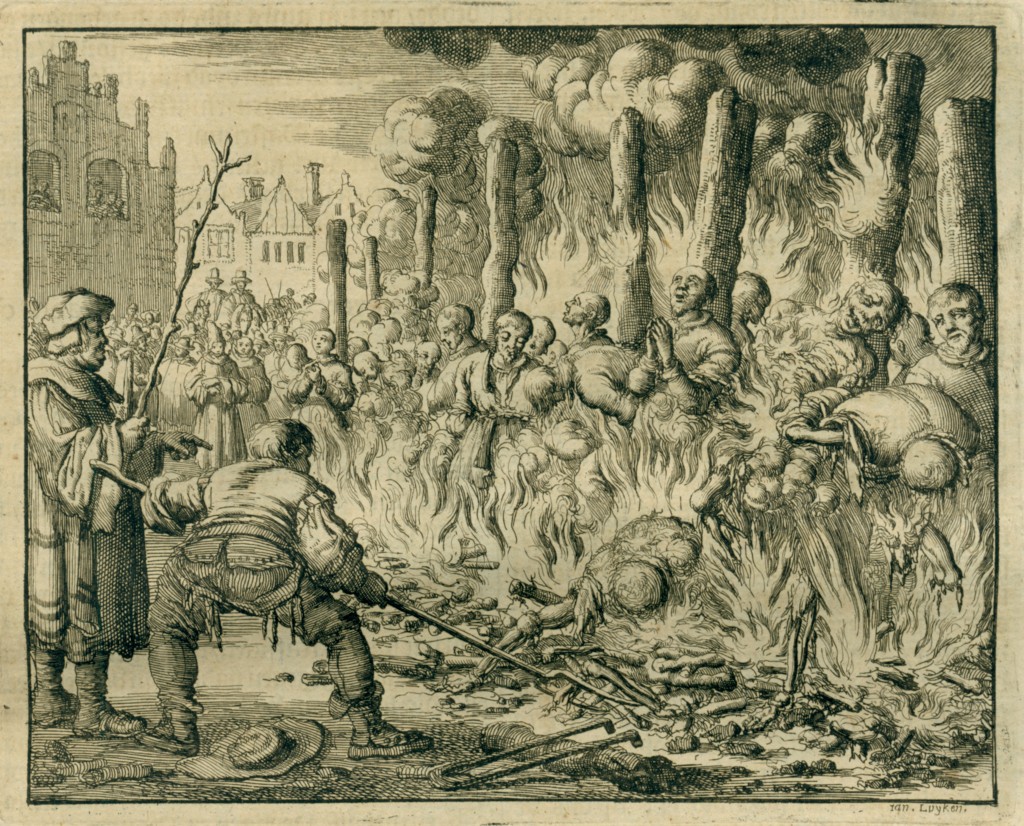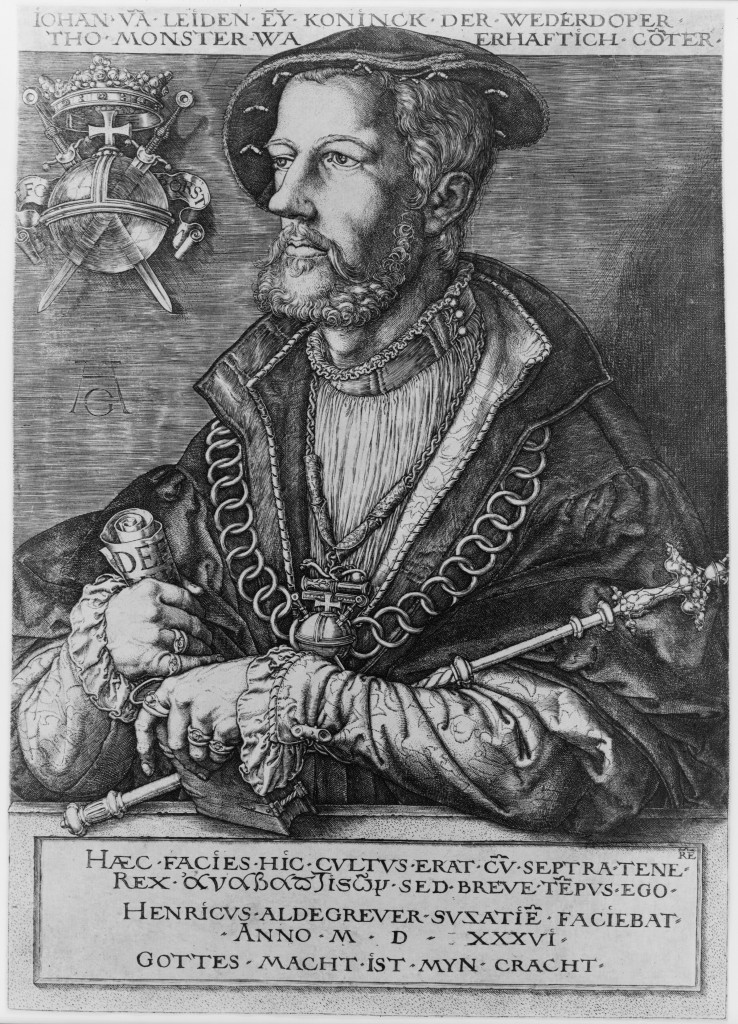” The glory of all the Saints, ” they asserted, ” is to wreak vengeance… Revenge without mercy is the fate of all who are not marked with the Sign”. ”Cohn notes that John of Leyden (aka Jan Bockelson) wrote that, come the New Jerusalem, “all things were to be in common, there was to be no private property and nobody was to do any more work, but simply trust in God.” Cohn notes that the “phantasy” of never working was part of the Roman Stoics’ legend of the Golden Age, in which (in the words of Seneca) “no labourers ploughed up the soil, nobody was allowed to mark out or divide the ground; when men [sic] put everything into a common store, and the earth bore all things more freely because none demanded it.”
Against this background of general misery and discontent, leading up to the Anabaptist revolution of Munster, one disaster followed another in Europe. In 1529, an outbreak of the Black Death ravaged Westphalia; the crops failed; warfare in the Baltic closed the ports and prevented the importation of grain. Between 1529 and 1530 the price of rye, the poor man’s staple, rose by 300 per cent. In 1530 the prince-bishop sought to ”sell’, his bishopric to the Bishop of Paterborn. Two years later, the town opted for Lutheranism and drove out its priests.
But Munster would not remain Lutheran, and conservative, for long. When, in 1532, the nearby Duchy of Cleves expelled its Anabaptists, many of them migrated to Munster, carrying with them their doctrinal contagion. From then on the movement grew within the walls of the city. In 1533 new recruits, the first of many, arrived from the Netherlands, among them Jan Bockelson of Leyden, a young man of twenty-four who had been baptized into the movement only a few months before. And these new arrivals called attention to a startling fact; the year 1533, in their eschatology, was the fifteenth centenary of the Passion of Christ. The last days of the world, the Anabaptists declared, were now at hand.
About the same time, and elderly baker from Haarlem named Matthys had succeeded to the mantle of the Anabaptist prophets, but unlike his peaceful predecessors Matthys preached the the millenium demanded blood. From Haarlem he sent out his ”apostles” to preach the doctrine of the imminent Coming and of rebellion against the princes of the world. He watched the rising fever in Munster. In Fedruary, 1534, he followed his young disciple, Jan of Leyden , to the city and preceded to take control.
In its feverish state, the city was helpless before them. Street crowds ruled the town, their numbers increased by the immigrants. A further cause of hysteria came from the hundreds of nuns who had broken their vows, put on secular dress, andd accepted baptism in the new faith preached by Matthys.”With some malicious satisfaction the Elector of Saxony made use of the opportunity to influence Philipp to take stronger measures against the Anabaptists. Already on 25 April 1534, he had called attention to the revolt in Münster as an example of the dangers of lenience. Philipp did not reply. He was obviously embarrassed. Expulsions from the country did no good. The Anabaptists kept returning. There were instances where they promised three times not to return, but still kept appearing. ”

''Wolfgang Ulman was burned at the stake with his brother and ten other Anabaptists at Walzen in 1528 as was the open air preacher Hans Prestle, after winning many converts to the saving grace of Jesus Christ. ''
The Anabaptists seized the town hall and the market place. The town council , Protestant in its sympathies, hesitated to use force and the result was a compromise. The Anaba
ts won legal recognition, but in the uncertain atmosphere of the town, the conservative elements began to flee. By early 1534 the fanatical sectarians made up the majority of the population. In leaflets exhorting neighboring towns they warned that the earth was doomed; by Easter it would be destroyed. But Munster, that New Jerusalem, that new Ark, would be saved. All who desired salvation were to come to the city. But, they were advised, come, but bring arms.
The result of these hysterical appeals was a new influx of believers, from parts as distant as Brabant in southern Holland. On Feruary 23, 1534, in a new election of the town council, the Anabaptists won a decisive victory. The first official move of the once-persecuted sect was to expel the remaining Catholics and Lutherans, all of them destitute, many of them half naked in the dead of the German winter. Those who remained underwent mass baptisms in the market place. by March, there were no more ”disciples of the Devil” left in Munster. Addressing one another as ”Brother” and ”Sister” , preaching perfect communal love, the Anabaptists made both Catholicism and Lutheranism capital offenses.
Whether the Anabaptists of Munster were creating the forerunner of the modern totalitarian state has been open to question. The revolution in Munster was striking in its modernities of class warfare, thought control, communal farms, an elite military corps, and a form of Gestapo. The Anabaptist leaders were brutal fanatics; believing that the world was an abomination of corruption, they were determined to destroy it:
”Either people such as Thomas Muntzer anticipated and set the stage for the totalitarian leaders of the twentieth century, or people such as Lenin and Hitler were throw-backs to the leaders of heretical medieval sects. Take your choice: the results are the same. For Cohn, there is only massacre and terror to be expected from the realization of Munzter’s or Hitler’s or Lenin’s respective “phantasies” of the “mystery and majesty of the final, eschatalogical drama”; there is only death and despair to be expected from these leaders’ “restlessly dynamic and utterly ruthless group[s] which, obsessed by the apocalyptic phantasy and filled with the conviction of its own infallibility, set itself above the rest of humanity and recognized no claims save that of its own supposed mission.” For Cohn, all three of them — Muntzer, Hitler, Lenin — are, in plain English, mentally ill. The theories of each sound like “a paranoiac expounding his private systematised delusion.” All three were obsessed with purifying the world by destroying the agents of corruption, who are consistently identified as the Jewish people. As for the followers of these mass-murdering, anti-Semitic madmen, they are simply “the great mass of the disoriented, the perplexed and the frightened.”
”The millenarians [Debord goes on to say] had to lose because they could not recognize the revolution as their own operation. The fact that they waited to act on the basis of an external sign of God’s decision is the translation into thought of the practice of insurgent peasants following chiefs taken from outside their ranks. The peasant class could not attain an adequate consciousness of the functioning of society or of the way to lead its own struggle; because it lacked these conditions of unity in its action and consciousness, it expressed its project and led its wars with the imagery of an earthly paradise.














 COMMENTS
COMMENTS



